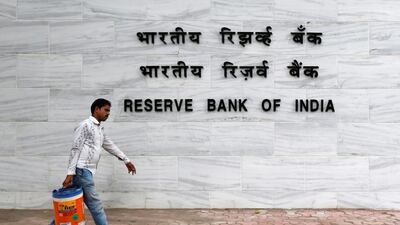The credit quality of Indian companies improved in the first half of the year, but headwinds such as slow global growth mean the recovery will be put to the test. There were 646 ratings upgrades and 553 downgrades of corporate debt in the first six months of the financial year from April to September, according Crisil Ratings, an Indian agency which is part of Standard & Poor’s.
This means that for the first time in the past 10 half-years, India’s corporate credit ratio rose above 1, where the value of debt upgraded is more than those downgraded.
The focus now shifts to the sustainability of the improvement, said Somasekhar Vemuri, a senior director at Crisil Ratings.
“The investment cycle is yet to pick up, there hasn’t been a material deleveraging in corporate balance sheets, and weak assets continue to mount in banking,” he said.
“To boot, global growth is also weak. Fresh rate cuts by the Reserve Bank of India, their transmission by banks, government’s continuing policy support, pace of implementation of reforms, and any sharp swings in rupee against the US dollar will be the other key monitorables.”
The RBI is holding its first monetary policy meeting under its new governor, Urjit Patel, with the announcement on interest rates scheduled to be made this afternoon, which will be closely watched.
Crisil said that upgrades were concentrated in consumer-linked sectors and the pharmaceuticals industry.
“Downgrades were mainly in the investment-linked sectors such as construction, industrial machinery, real estate and metals,” Crisil said.
It added that in the near term, the consumer sector would get a boost from what has been a near-normal monsoon, which helps to increase spending in rural areas, while investment- linked sectors would remain under pressure.
Separately, the Canadian pension fund manager CDPQ on Monday unveiled plans to invest up to US$700 million into the restructuring of stressed assets in India and private debt over the next four years, as it entered into a partnership with Edelweiss Group, a financial services company based in Mumbai.
Stressed assets have proved a headache for banks in India, as a number of companies have become highly indebted.
Rashesh Shah, the chairman and chief executive of Edelweiss, said stressed assets were “a problem and an opportunity in India”.
“With the recent reforms, like the bankruptcy code, the government has provided a good platform to start unlocking these assets by restructuring, resolving, providing additional capital and bringing the asset back into a productivity scenario in the country,” he said.
The partnership would acquire stressed assets from banks, restructure debt, give them additional financing and turn around companies, he said. It would also provide finance to high-growth Indian companies and entrepreneurs.
Michael Sabia, the president and chief executive of CDPQ, said that India was “one of its top priorities” because of its economic growth potential and the fundamentals behind this, such as structural reforms that were taking place, the expansion of the middle class and “the growth and the growing sophistication of India’s financial sector”.
Tata Power and ICICI last month announced they had partnered with CDPQ, alongside the Kuwait Investment Authority and State General Reserve Fund of Oman, with an initial capital of US$850 million, to invest in power projects in India that were nearing completion or already operating, targeting acquisition of controlling stakes in thermal, hydro and transmission assets.
business@thenational.ae
Follow The National's Business section on Twitter

